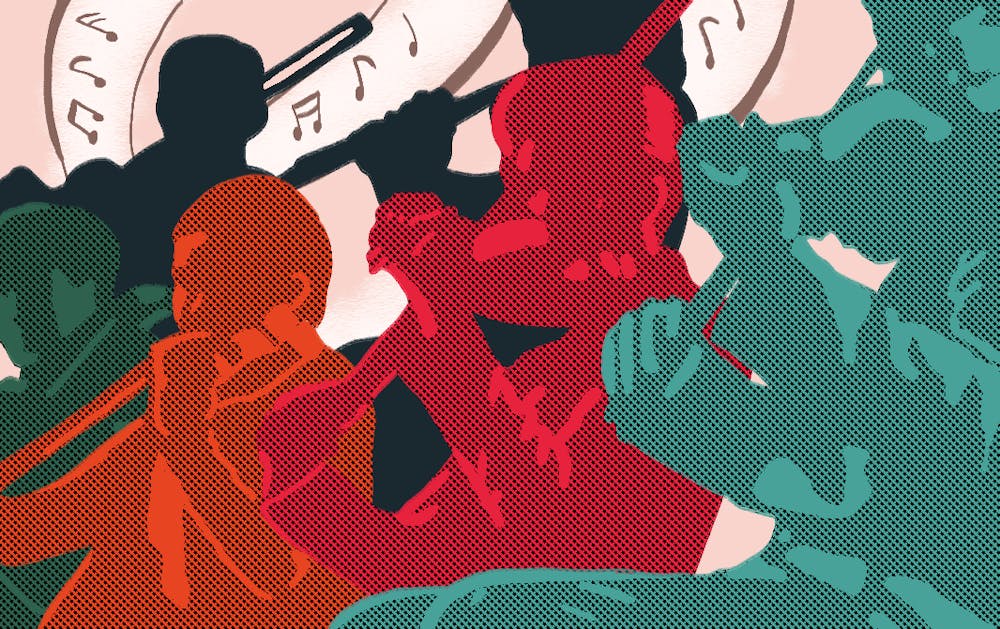Music classes are an essential part of early education, providing important life lessons in creativity and expression while teaching the history and importance of music in all societies.
These classes are also an incredibly enjoyable and rewarding experience for young children that will have a lasting impact on how they interact with the world around them.
But not all kids will have these same opportunities.
Frequently, financial barriers bar kids who might otherwise want to join from beginning band programs. Barriers such as initial instrument cost, instrument maintenance and time commitment often prevent families from signing up their kids for these classes despite their interest.
These barriers are not insurmountable for many families, but teachers often reinforce them in their own practices when they instead should be fighting to overcome them at every turn.
At ASU, students studying to be the next generation of educators are not taught how to overcome these barriers with their future students.
Not only do the methods of teaching introduced at the collegiate level not address these issues enough, they frequently regurgitate outdated ideas that perpetuate the inequalities in our education system.
If we are to pursue equity in our music programs, we must start by giving our future educators the proper tools with which to create it.
A recent presentation at the Texas Music Educators Association’s virtual conference, one of the premier conferences for music educators in the U.S., laid out the presenter’s guidelines for selecting bassoon students.
Some of the criteria included a high socioeconomic status and a stable home, which when listed alongside factors like intelligence, showed the presenter’s clear contempt for students with less financial means.
While the presenter has since apologized, the presentation represents the very commonly held idea that because these unfortunate realities are so often present, we must allow them to dictate our practices.
This approach is harmful to our students, discourages many who could find safety in music by pursuing band in school, and is frequently introduced to future music educators in their college experience.
While it is true that there are significant barriers to entry in music, relenting to them only reinforces their importance and prevents us from moving beyond these issues as a community.
“It’s a good idea to get the parents involved, have band boosters, have systems of fundraising in place to alleviate financial burden,” said Jared Waters, a doctoral student studying saxophone performance.
Taking these steps, although difficult at first, goes beyond simply helping students and their families experience music equitably. It demonstrates a willingness to fight inequality in our education system and removes the complacency that disparity feeds upon.
Similarly, scheduling programs after school unintentionally discriminates against these students. It is imperative for educators to realize that a little leniency and assistance goes a long way to motivate a potential music student.
"What happens if you have after school rehearsals and the parent can’t pick their kid up? This is just seventh, eighth grade, and already there are so many barriers,” Waters said.
The first step in closing the overwhelming disparities in our education system is to acknowledge that we are reinforcing them with our behavior. Only then can we make progress toward removing them.
“All this is trying to do is give everyone a shot, it may seem like everyone’s got a chance, and if you just apply yourself and work hard you’ll be successful, but that’s not the case,” Waters said.
The power remains in the hands of educators to overcome the challenges their community faces, and although it may be difficult, we must constantly work to break down barriers that would impede our students.
“You have to constantly be looking out and preparing for the best interests of your students," Waters said. "(Acknowledge) what the barrier is that is in place, and (find) how we alleviate that barrier to make a system that is more equitable.”
The role of an educator isn’t to fit into a society, but to shape it by removing obstacles to student performance and engagement as much as possible.
At ASU, we should be instilling this idea into our future educators and providing them with the means to combat and close the disparities in the communities they will serve.
Without this knowledge they will perpetuate a vicious cycle that will keep music exclusively for the privileged, and out of the hands of so many who want to participate.
It is essential that music educators recognize that change begins with them, and they they must start now.
Reach the columnist at tkgerald@asu.edu or follow @TKGeraldMusic on Twitter.
Editor's note: The opinions presented in this column are the author's and do not imply any endorsement from The State Press or its editors.
Want to join the conversation? Send an email to opiniondesk.statepress@gmail.com. Keep letters under 500 words and be sure to include your university affiliation. Anonymity will not be granted.
Like The State Press on Facebook and follow @statepress on Twitter.
Continue supporting student journalism and donate to The State Press today.




